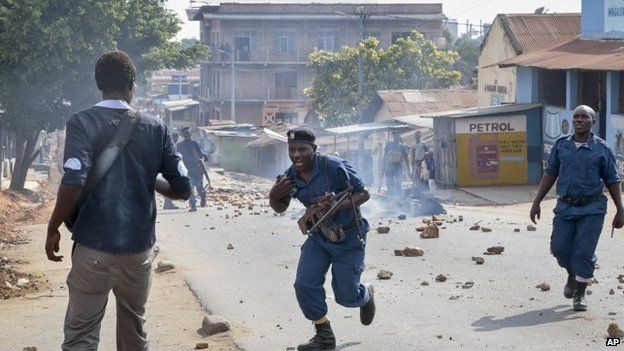Burundi grenade attacks kill four ahead of election
- Published

Four people have been killed and 30 wounded in a wave of grenade attacks overnight in Burundi, police say, a week before parliamentary elections.
A single attack on a bar in Ngozi, the hometown of President Pierre Nkurunziza, accounted for the majority of the victims.
Police blamed the attacks on opposition supporters and said three suspects had been arrested.
Violent protests began in April against the president's third-term bid.
In two grenade attacks overnight, one police officer was injured in the capital Bujumbura, and two people injured after an explosion near a bank in the northern town of Kirundo, police said.
Rights groups say at least 70 people have been killed and 500 wounded since the protests began in April.
More than 100,000 people have fled Burundi since the start of the crisis, the UN says.
In a separate development, the European Union has threatened to impose sanctions against those responsible for the violence in Burundi.
On Friday night 11 police officers were wounded in simultaneous grenade attacks in the capital Bujumbura.
"It is clear that all these grenade attacks are related to each other, this is a terror campaign organised by opponents of... President Pierre Nkurunziza," a senior police officer is quoted as saying by AFP news agency.
But opposition and civil society groups rejected that interpretation:
"Our movement is and will remain peaceful," Jeremiah Minani, spokesman of the Arusha Movement, a coalition of different groups opposing the president's controversial bid for a third term, told AFP.
Opponents of Mr Nkurunziza say the attacks are aimed at creating instability, which would provide the security services with a pretext for a crackdown, the BBC's Karen Allen reports from Nairobi.
The president's critics say his bid for a third term contravenes the constitution, which requires him to step down after two terms.
But Burundi's Constitutional Court ruled that Mr Nkurunziza's first term does not count because he was elected by parliament and not voters.
In May, the president survived a coup attempt.
The election was due in June but was put back to 15 July following pressure from regional leaders.
Parliamentary elections are now due on 29 June.
- Published15 May 2015
- Published14 October 2015
- Published13 May 2015
- Published15 May 2015